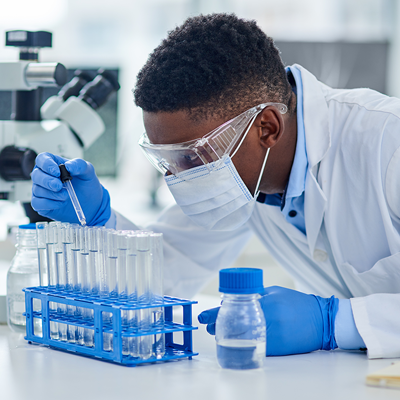
Lowering the cost of treatment would be welcome news for people with cancer and their loved ones. After all, 8 of the 10 most expensive drugs on the market are cancer drugs, according to a 2018 statement by the American Society of Clinical Oncology (ASCO).
Biosimilars are potentially cheaper versions of other drugs that are being developed as treatments for cancer and other diseases. However, it is important to note that biosimilars are not defined by their cost alone, and in some cases, they may not be much cheaper than other drugs. Here, find out what biosimilars are, how they can be used to treat cancer, and how they can help lower the costs of cancer care.
1. What is a biosimilar?
A biosimilar is a version of a known and proven biologic drug. Biologic drugs are drugs that are made from living things like cells, tissues, or proteins. Vaccines and antibodies are examples of biologic drugs.
Biologic drugs are important in cancer treatment for several reasons. Some biologics can trigger your body’s natural response to fighting cancer. Sometimes in cancer, your body does not recognize the cancer cells as being bad. Biologic drugs can stimulate your body to spot cancer cells and attack them. Some biologics attack cancer cells directly and interfere with growth signals. Other biologics can help you fight infection after chemotherapy.
A biosimilar is based on a biologic drug that’s already been researched, developed, evaluated for safety and effectiveness through clinical trials, and approved by the U.S. Food and Drug Administration (FDA). The biologic drug is often called a “reference drug” because the biosimilar is based on the approved drug. The biosimilar works the same way as its reference drug and also has to be approved by the FDA.
A biosimilar is somewhat like a generic version of a biologic drug, though the 2 are not entirely the same. A generic drug has the same active ingredients as its brand name drug. Biosimilars are not considered generic because there may be small differences between the biosimilar and its reference drug. However, these variations do not cause clinical differences in the biosimilar’s safety or how well it works.
2. How can biosimilars help with the cost of cancer care?
Biologic drugs are expensive. They treat some of the most difficult, deadly diseases. They are also more complex in structure than other drugs. They are often tricky to manufacture and store because they are made from living things. They are sensitive to light and temperature, which means they need to be manufactured in tightly controlled environments. All of these factors add to the cost of the drug.
Biosimilars are based on drugs that have already gone through the expensive process of research and development, so they may cost less to make and to test than the reference biologic drugs. Because of this, biosimilars can offer lower-price options for patients while delivering the same treatment effectiveness. The costs of biosimilars may be different for different patients. That’s because coverage for drugs differs between health insurance providers like Medicare, Medicaid, or private insurance. While biosimilars may cost less than their reference drugs, biosimilars are still not low-cost treatment options for cancer.
Researchers believe that biosimilars can eventually be interchanged for biologic drugs. Interchangeability would mean that the safety and effectiveness of the treatment would not change if a patient were switched to a biosimilar from the reference drug.
3. What kinds of biosimilars are used to treat cancer?
In the United States, FDA-approved biosimilars can be used to treat breast cancer, stomach cancer, colorectal cancer, and other cancers. They can also be used to treat side effects of cancer treatments, such as low white blood cell counts that increase the risk of infections. Below are some of the cancer-related biosimilars currently approved in the United States. You can also find a list of all FDA-approved biosimilar drugs on their website.
-
In March 2015, the FDA approved the first biosimilar, called filgrastim-sndz (Zarxio). It is a biosimilar that helps your body fight infection. Filgrastim-sndz stimulates the body to make white blood cells. People with cancer who receive chemotherapy, bone marrow transplants, and other treatments can often have low levels of white blood cells. Filgrastim-sndz’s reference drug is called filgrastim (Neupogen). Filgrastim-aafi (Nivestym) is another FDA-approved biosimilar to filgrastim.
-
In September 2017, the FDA approved bevacizumab-awwb (Mvasi) as the first biosimilar to treat cancer. Bevacizumab-awwb treats certain colorectal, lung, brain, kidney, and cervical cancers. Its reference drug is called bevacizumab (Avastin). Bevacizumab-bvzr (Zirabev) is another FDA-approved biosimilar to bevacizumab.
-
From 2017 to 2019, the FDA approved trastuzumab-dkst (Ogivri), trastuzumab-anns (Kanjinti), trastuzumab-pkrb (Herzuma), trastuzumab-dttb (Ontruzant), and trastuzumab-qyyp (Trazimera), which are biosimilars that treat certain breast and stomach cancers. Their reference drug is trastuzumab (Herceptin).
-
From 2018 to 2019, the FDA approved pegfilgrastim-jmdb (Fulphila), pegfilgrastim-cbqv (Udenyca), and pegfilgrastim-bmez (Ziextenzo), which are biosimilars that help fight infection, specifically in people with non-myeloid cancer treated with chemotherapy. Their reference drug is pegfilgrastim (Neulasta).
-
In November 2018, the FDA approved rituximab-abbs (Truxima) as the first biosimilar to treat people with non-Hodgkin lymphoma. Its reference drug is rituximab (Rituxan). Rituximab-pvvr (Ruxience) is another FDA-approved biosimilar to rituximab.
Talk with your health care team if you have questions about biosimilars. Many practices are already using biosimilars as they work to make cancer care more affordable. Coverage and reimbursement for any medication depends on your health insurance, so talk to your insurance provider if you have questions about whether or how biosimilars are covered.
The American Society of Clinical Oncology (ASCO) supports the use of biosimilars in cancer care. Read more about this on a separate ASCO website.
